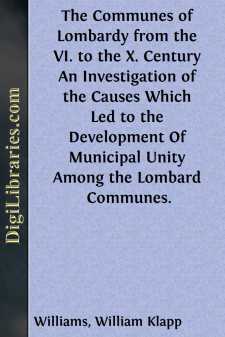Categories
- Antiques & Collectibles 13
- Architecture 36
- Art 48
- Bibles 22
- Biography & Autobiography 813
- Body, Mind & Spirit 142
- Business & Economics 28
- Children's Books 14
- Children's Fiction 11
- Computers 4
- Cooking 94
- Crafts & Hobbies 4
- Drama 346
- Education 46
- Family & Relationships 57
- Fiction 11828
- Games 19
- Gardening 17
- Health & Fitness 34
- History 1377
- House & Home 1
- Humor 147
- Juvenile Fiction 1873
- Juvenile Nonfiction 202
- Language Arts & Disciplines 88
- Law 16
- Literary Collections 686
- Literary Criticism 179
- Mathematics 13
- Medical 41
- Music 40
- Nature 179
- Non-Classifiable 1768
- Performing Arts 7
- Periodicals 1453
- Philosophy 64
- Photography 2
- Poetry 896
- Political Science 203
- Psychology 42
- Reference 154
- Religion 513
- Science 126
- Self-Help 84
- Social Science 81
- Sports & Recreation 34
- Study Aids 3
- Technology & Engineering 59
- Transportation 23
- Travel 463
- True Crime 29
The Communes of Lombardy from the VI. to the X. Century An Investigation of the Causes Which Led to the Development Of Municipal Unity Among the Lombard Communes.
Description:
Excerpt
THE LOMBARD CONQUEST AND ITS RESULTS.
Before tracing the beginnings of renewed municipal life in Northern Italy, we must consider the conditions of land and people, which first rendered possible and then fostered the spirit of local independence of which such beginnings were the natural expression. To do this we must commence our researches with the first domination of the Lombards in the country.
In detail the story of the conquest of Northern Italy by the Lombards under Alboin, in 568, hardly differs materially from that of the inroads of other barbarian tribes of the north on the fertile plains of Italy. The causes were the same. Where the distinction is to be found from other such invasions, is in the results of the Lombard occupation, and in the different methods which the Lombards adopted so as to render their power and their possessions permanent. Let us look at the character of this invading host, which sweeps like a tide, at once destroying and revivifying, over the exhausted though still fertile plains of the Po and the Adige. Are we to call it a moving people or an advancing army? Are we to call its leaders (duces, from ducere to lead), heads of clans and families, or captains and generals? Finally, is the land to be invaded, or is the land to be settled? To all these questions the only answer is to be found in the conception of the absolute union of both the kinds of functions described. A people is moving from a home whose borders have proved too narrow for its increasing numbers; an army is conquering a new home, where plenty will take the place of want, and luxury of privation. It is not an army marching at the command of a strongly centralized power to conquer a rich neighbor, and force a defeated enemy to pay it service or tribute. It is a body which, when it has conquered as an army, will occupy as a people; when it is established as a people, will still remain an army. The sword was not turned into the ploughshare; but the power to wield the sword had given the right to till the land, and soon the power to hold the land was to give the right to wear the sword. It was the conquest of a highly civilized agricultural people—whose very civilization had reduced them to a stage of moral weakness which rendered them totally unfit to defend themselves—by a semi-barbarous people, agricultural also, but rude, uncivilized, independent, owning no rulers but their family or military chiefs.
The conquerors took possession of the country simply as they would take possession of a larger farm than they had before owned. Their riches were only such as served for the support of men—herds, land, wine and corn. They needed cultivators for their large farm, so instead of destroying every one with fire and sword, they spared those of the weak inhabitants of the land who had survived the first onslaught, in order that they might make use of farmers to cultivate their new possessions. In most cases they did not make slaves of them, but tributaries; and after the land had been portioned evenly among the soldiers of the invading host, the original holders of the land tilled it themselves, under a system somewhat kindred to the metayer system as to-day existent in Tuscany and elsewhere, paying, according to the usual custom adopted by the northern conquerors of Italy, one-third of the produce[1] to their new masters....


